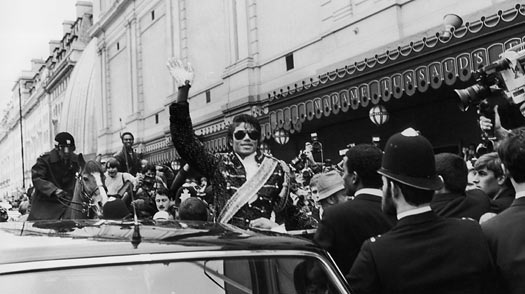
Michael Jackson arrives at London England's Madame Tussaud's Waxwork Museum to unveil his sculpture in 1985.
Michael Jackson's glorious decade began with a forgotten failure. Michael hadn't yet turned 20 when he got his first co-starring role in a big movie: The Wiz, a black version of The Wizard of Oz that had been a hit on Broadway. Jackson was cast as the Scarecrow, and he studied hard for the role, his impossible flexibility and cheerful demeanor making him an ideal companion to Diana Ross's Dorothy. But nothing in the project jelled. The Wiz was an expensive flop, with one important asterisk: Jackson struck up a friendship with the film's musical supervisor, Quincy Jones.
For nearly a quarter-century, Jones had been helping singers sound their best: Ray Charles, Frank Sinatra, Ella Fitzgerald. The Wiz was just a bump in Jones' yellow brick road, or perhaps a fortunate detour. Jackson, already ensconced at Epic Records, asked Jones to produce his next album. It would be a great career move for both men. Off the Wall, their first collaboration and Jackson's fifth studio album, was the one that shaped MJ's style, spawned some hits and sped him toward superstardom.
The new assurance was evident from the album's first single, "Don't Stop 'Til You Get Enough." With a disco beat indebted to the Bee Gees' Saturday Night Fever and a lyric that was suggestive enough to reportedly incur the disapproval of Michael's mother Katherine, the song went to No. 1 on the U.S. charts. Jackson's voice hadn't changed, but he amped up the level of urgency and authority and tried out the first of the grunts and squeals that would become a vocal trademark. That was surely thanks to Jones; you can almost hear him pushing Jackson to stand tall and sing what he feels, even if words can't possibly express it. "Everybody sang high in Motown, even Stevie [Wonder]," says Jones. "I wanted to feel the full range of his voice, and I wanted him to deal with more mature kinds of themes. That's why 'She's out of My Life,' a song that Tommy Baylor wrote about the very bad ending of a marriage, that I was saving for Sinatra, I did with Michael. Because Michael I don't think had ever dealt with an emotion that deep in just a regular normal romance. And he cried on every take. Every take we did, he cried. I left the tears on the record because it was real." Off the Wall launched four singles into the Billboard Top 10 and eventually sold 20 million copies. That made it a giant of its day; it would be a midget next to the album that followed.
Even in his 20s, Jackson's ambition was as hard as his voice was soft. Privately he never hid his desire to become the biggest force in entertainment, and when he and Jones regrouped to begin work on Thriller in 1982, Jackson had every intention of making a career-defining colossus. The amazing thing is that he made such a lovable one.
Jackson and Jones sifted through more than 700 songs by the best professional songwriters in a quest to find nine perfect tracks. "We turned that album upside down," says Jones, and arguments over material were common. Jackson loved the iconic bass line for "Billie Jean"; Jones did not — score one for Jackson. But gradually the two felt confident that they had a record that was all hits and no filler, something the entire world would love — and purchase.